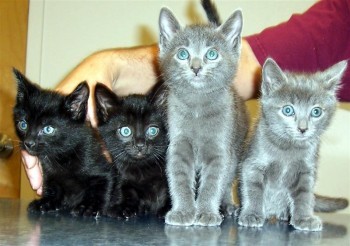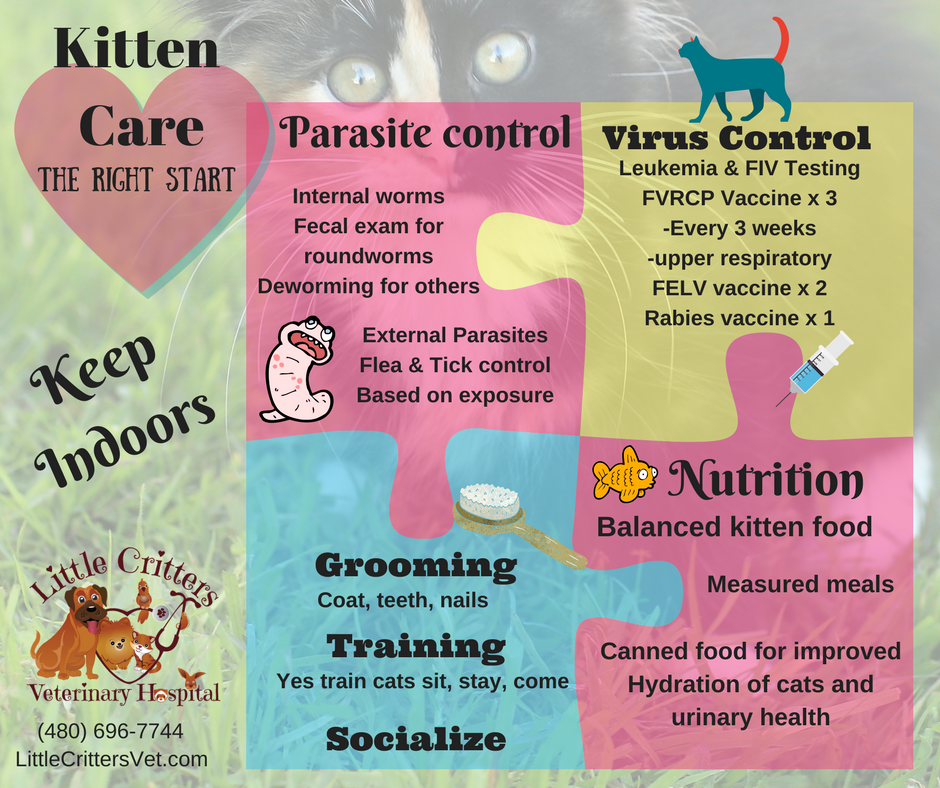|

Common Signs of Illness:
– Head Cold like signs and/or diarrhea Common signs of illness in kittens are often similar to a person with a head cold (although not an infection shared with humans) with sneezing, nasal discharge and runny eyes. Cats can actually become infected with several different types of upper respiratory infections (URI) and can cause signs similar to a head cold. Some of these URIs can also cause eye infections and corneal ulcers. Ulcers are an injury to the surface of the eye from the virus and can be very painful to the kitten. Typically the cat will squint and have tearing. If seen, this should always be addressed quickly to avoid further injury or rupture of the eye. Supportive care for the sick kitten often involves treating any eye infections, antibiotics for secondary bacterial infection (if indicated), fluids for dehydration and ensuring adequate food intake. Cats eat based on smell and with a stuffed up nose many kittens will have a decreased appetite. A good way around this is to keep the nose clean and warm up the food to bring out the smell.
Typical Vaccines:
May vary somewhat between hospitals and states
1) FVRCP:
Protects from organisms that can cause respiratory infections as well as eye infections, vomiting and diarrhea. We will typically give the combined FVRCP vaccine every 3 weeks for a series of 3 visits.
- Calici Virus
- Chlamydia psittaci
- Feline Rhinotracheitis
- Panleukopenia virus
2) FELV:
Protects from feline leukemia virus which causes immunosuppression and opportunistic infections and cancer. The leukemia vaccine is only given to cats with potential exposure to other cats. Typical transmission is via bite wounds or fighting. A booster is needed.
3) Rabies:
Protects from Rabies virus Rabies is given once at the last kitten visit and repeated yearly or every 3 years based on state laws. Cats are one of the growing risk groups for rabies infection in the US. In part this is due to poor owner compliance with vaccination and also the cats are more likely to encounter infected wildlife such as bats.
Diarrhea:
From parasites, viral infection or dietary changes
Another common problem in kittens is diarrhea. Diarrhea can occur from parasites, viruses and dietary change. We always recommend that you convert your new pet to any new diet slowly to avoid diarrhea. All kittens showing diarrhea should have a physical examination to check the kitten’s general health and also a fecal examination for potential parasitic infections. Most parasitic infections can be easily eliminated with the appropriate medications. However, many parasite infections require different types of medication, so you should always have a fecal exam done to identify the specific parasite which allows treatment with the appropriate medication.
Recommend deworming all kittens at least twice with a medication effective against roundworms and hookworms.
Additional Suggestions:
- New kittens should be tested for FELV/FIV (leukemia & feline immunodeficiency virus
- All new pets should have a microchip placed for permanent identification
- Flea and tick prevention may be needed depending upon the state of residency and potential exposure to the outdoors
Spay & Neuter:
All pets should be spayed or neutered to prevent unwanted pregnancies, reduce disease occurrence and help control roaming and urine marking. The age will vary with the hospital but typically we recommend sterilizing between 4-6 months of age

|